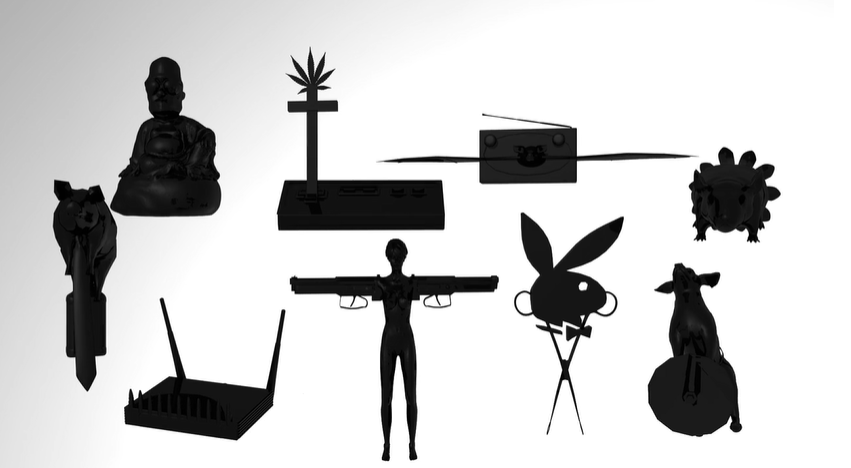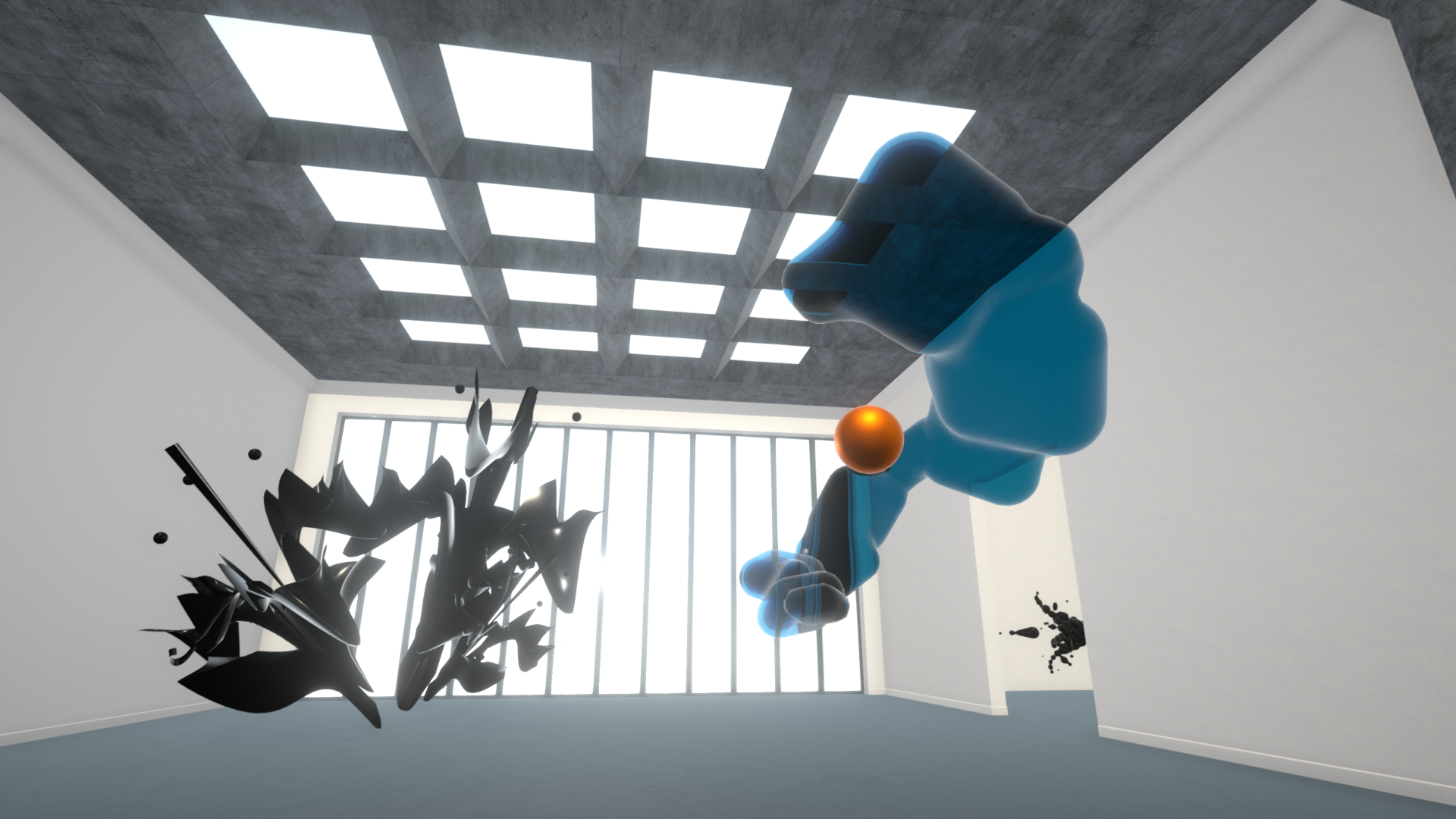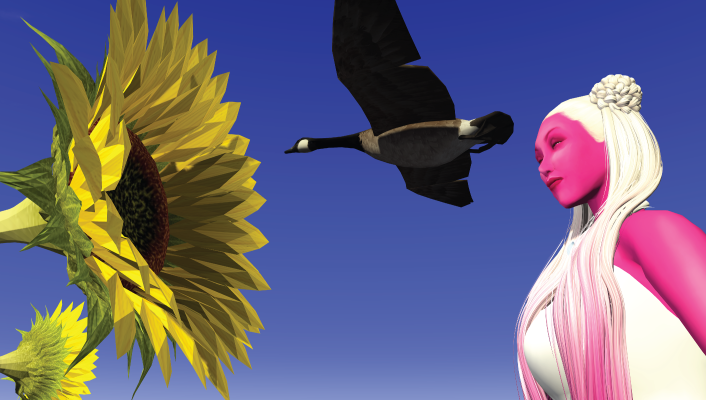Carnegie Mellon University School of Art
Term: Fall 2024
Course number: 60213
Location: CFA 303
Days / time: Monday + Thursday – 10:00AM 12:50PM
Professor: Paolo Pedercini (paolop)
Office: School of art 419A – 4th Floor
Office hours: By appointment
Description:
Game Studio: Real Time 3D is a hands-on intermediate course focused on immersive environments, world building, character creation, and real time experiences at the boundaries of gaming.
On a conceptual level we’ll look at practices within digital art and independent game development: virtual architecture and sculpture, walking simulators, avatar-based performances, and other playable media.
On a technical level the course will introduce you to 3D modeling for real time applications (using Blender) and game engine workflows (using Unity) as a scaffolding for advanced courses.
Students will work individually. Experience with game engines and 3D modeling is not required.
UNITS
Each of the units will include a lecture/brainstorming, some technical tutorials, a warm-up workshops, self-directed work time, and a critique.
Found Virtual Objects

Project – Thing made out of things: Collect 20 models of everyday objects that are all the same, or belong to the same category. Use these objects as building blocks to create an object that in the process renders the original objects secondary (but not necessarily unimportant). Feel free to alter the objects but keep them recognizable. Adapted from an exercise by Jessica Stockholder’s.
Project – Glitching hour: You have one hour to find an ordinary 3D model online and radically and meaningfully transform it. Find something iconic, with cultural baggage, and that you have mixed feeling about.
Topics: intro to Blender, finding models online, clean up, basic manipulation, modifiers, selections, sculpting, Blender to Unity pipeline.
Abstract Sculptures

A series of short assignments to familiarize yourself with 3D modeling tools.
Projects: angular vs organic, curves and layers, blobs, material and texture.
Topics: hard surface modeling tools, sculpting, PBR materials.
Artifact

Project: Model an archeological item from another planet, dimension, or alternate history.
Can you avoid sci-fi or fantasy clichés? Can you imagine a world around it? Does the object suggest its own use?
Topics: World building, concept art for props, box modeling, basic UV unwrapping, texturing with Substance Designer.
Avatar

Project – Mickye Muose: Mickey Mouse is entering public domain! Create your interpretation of the iconic character either starting from scratch of by modifying an existing model.
Project – non normative base mesh: Create a base mesh for a non-normative/conforming/stereotypical body type.
Project – Avatar: Design an avatar/costume for a very specific circumstance.
It has to be riggable as a humanoid.
Project – Abstract avatar: Design a non humanoid character to be animated with motion capture data.
Topics: character design, concept art, (auto)retopology, (auto)rigging, basic weight painting, skeletal animation, using stock mocap, controlling character animations in engine.
TBD
Morphing Object, breakable object (blendshapes, real time physics), Pile and fabric (blender physics).
Modular kit (Environment art).
LEARNING OBJECTIVES
Upon completion of the course you will be able to:
- Scope a project according to limited time and resources
- Use game engines and 3D modeling tools for game and non game projects
- Identify promising concepts and accept failures and dead ends
- Contextualize your own work within contemporary cultural practices
- Develop your personal style and artistic identity
- Add at least one piece to your creative portfolio
REQUIRED MATERIAL
Hardware:
-A laptop. You don’t need a powerful gaming computer but consider we won’t be working in a school lab.
-The charger is not optional.
-A 3 button mouse. You can’t work in 3D without it.
INTELLECTUAL PROPERTY
Unless the assignment specifically asks for it, all the creative output and designs must be original creations. You cannot work on somebody else’s intellectual property (aka fan art). That includes models based on somebody else’s concept art.
GRADING
Qualitative feedback during in-class critiques is the most important form of evaluation and you will get plenty of it, but we live in a quantified society so grades need to happen.
D/E– You didn’t deliver the assignment / the creation is not your IP.
C– You delivered something that is not matching the assignment’s requirements / that has been submitted to late / that is clearly a last minute perfunctory effort
B– You delivered something that is matching all the assignment requirements, both technical and conceptual
A– You delivered something that went beyond the expectations / that involved some autonomous learning and research / that is original, meaningful, conceptually developed / that can be made public and stand by itself as a work of art or a portfolio piece.
Final grade composition
The unit score includes assignment, exercises, and class participation.
Thing out of things: 5%
Glitching hour: 3%
Abstract Sculptures: organic / inorganic: 5%
Abstract Sculptures: lines and layers: 5%
Abstract Sculptures: blobs: 2%
Abstract Sculptures: materials: 5%
Artifact: 15%
Non-normative base mesh: 2%
Character knockoff: 3%
Avatar: 15%
Environment/final: 15%
TBD: 15%
Participation: 10%
POLICIES
I’ll ask you to read and sign a little contract. We will discuss it and amend it on the first day of class.
* Absences:
I will inform the professor and my teammate of my absences via email at least one hour before class.
I’m entitled to a total of 4 absences over the course of the semester.
This class doesn’t differentiate between justified and unjustified absences. I am not required to give my professor any justification nor explanation for my absences.
I am aware that more than 4 absences will trigger a check from my academic advisor, the university’s health services, or disability resources. If the extra absences are not validated, they will produce one letter grade drop on my final grade.
I am responsible to catch up with the class, and to look into the material that I have missed.
I will not expect any online or hybrid accommodation if I’m not able to attend class.
* COVID 19
I will comply with CMU and the CDC coronavirus policies regarding isolation and quarantine.
I understand absences due to COVID may have to be validated by the university.
* Tardiness:
Arriving over 15 minutes after the scheduled start time will count as absence.
* Participation:
I will engage actively in discussions and critiques.
I expect the professor to adopt a variety of critique formats to account for different personality types.
* Net addiction
I value face-to-face interaction, so I commit to not use phones and computers during lectures, critiques, and discussions, ie. any time somebody is presenting to the class, except for taking notes.
* Computer habits
I understand that using my personal laptop will require more responsibilities on my side:
-I will disable all push notifications from social media unrelated to class
-I will reboot my system before class and close all the applications
-I will bring and use a mouse when it’s required
-I will bring and use my charger all the time
-I will make sure I have enough room in my hard drive
-I will make sure I have all the required applications installed
-If unable to meet these basic requirement I will use the school computers.
* Communications
I will use the class Discord to keep up with asynchronous communications, announcements, and questions that could be of general interest.
To keep a proper record, I will use the CMU email for personal communication with the professor.
*Assignments
I will negotiate late assignment submissions with the professor at least 24 hours before the deadline. I understand it will have to be justified and will not be automatically granted.
I will be present and participate to critiques even if I don’t have my work.
*Flipped Classroom
In a flipped classroom model the technical demos are assigned as homework, while class time is for more interactive activities.
I will watch all the mandatory video tutorials, taking them as seriously as studio assignments and class participation.
While I don’t have to immediately master everything covered in the videos, I understand that being unaware of the content of previously assigned videos (i.e. being caught not watching them) will penalize my participation grade.
*Office hours
I am entitled to a one-to-one meeting with the professor for feedback and general check-in every semester.
*Plagiarism and “collaborations”
I acknowledge that the concept of plagiarism is somewhat elusive in digital media as we working with open source tools and libraries, remixing and building upon the work of a multitude of people.
I will credit all the work and components that I use according to the licenses applied to them.
I will not outsource the class work to other people nor plagiarize assignments and exercises from my classmates.
*Generative AI
I will not use large language models such as chatGPT in the production of response papers, research, documentation, and correspondence.
I acknowledge that generative AI tools such as chatGPT or Midjourney are allowed in creative studio projects unless otherwise specified. I will declare where and how such tools have been used.
*Community agreements
These statement apply to both student and instructors:
We will speak from our own experiences (make ‘I’ statements).
We will respect differences; we’re all privileged in some ways.
We agree to critique ideas, not people.
We will not assume the identity of others, nor ask individuals to speak for their perceived social group.
We will hold this as a brave space, where we take risks, be vulnerable and hold each accountable with love and respect.
We agree to have only ‘one mic’: we will listen respectfully without interrupting.
We agree to practice active listening: when someone is speaking, we will listen without also thinking about how we are going to respond/rebut.
We may share what we learn but will keep others’ stories and personal experiences in confidence.
We will ‘move up, move up’: those who tend to speak a lot will ‘move up’ their listening; those who tend to hold back and listen will ‘move up’ their speaking.
INCLUSIVITY STATEMENT
It is my intent that students from all diverse backgrounds and perspectives be well served by this course, and that the diversity that students bring to this class be viewed as a resource, strength and benefit. It is my intent to present activities that accommodate and value a diversity of gender, sexuality, disability, age, socioeconomic status, ethnicity, race, and culture. I will gladly honor your request to address you by your preferred name and gender pronoun. I commit to make individual arrangements to address disabilities or religious needs (e.g. religious events in conflict with class meetings). Please advise me of these preferences and needs early in the semester so that I may make appropriate changes to my plans and records. Debate and free exchange of ideas is encouraged but I will not tolerate harassment, i.e. a pattern of behavior directed against a particular individual with the intent of humiliating or intimidating.
CONTENT/TRIGGER WARNINGS
Being in an art school, you should expect to be exposed to content that challenges your moral, ethical, and aesthetic values. In case of extremely graphic content I will warn the class in advance, but if you have a history of PTSD please let me know privately if there are types of content that are known to act as trauma triggers for you.
STRESS CULTURE
Collaborative work and projects also fulfilling other classes’ requirements are encouraged as long as it makes sense, and the other professors agree. Official university language: Take care of yourself. Do your best to maintain a healthy lifestyle this semester by eating well, exercising, avoiding drugs and alcohol, getting enough sleep and taking some time to relax. This will help you achieve your goals and cope with stress. All of us benefit from support during times of struggle. You are not alone. There are many helpful resources available on campus and an important part of the college experience is learning how to ask for help. Asking for support sooner rather than later is often helpful. If you or anyone you know experiences any academic stress, difficult life events, or feelings like anxiety or depression, we strongly encourage you to seek support. Counseling and Psychological Services (CaPS) is here to help: call 412-268-2922 and visit their website at http://www.cmu.edu/counseling/. Consider reaching out to a friend, faculty or family member you trust for help getting connected to the support that can help.
Header image from Hohokum by Honeyslug and Richard Hogg
